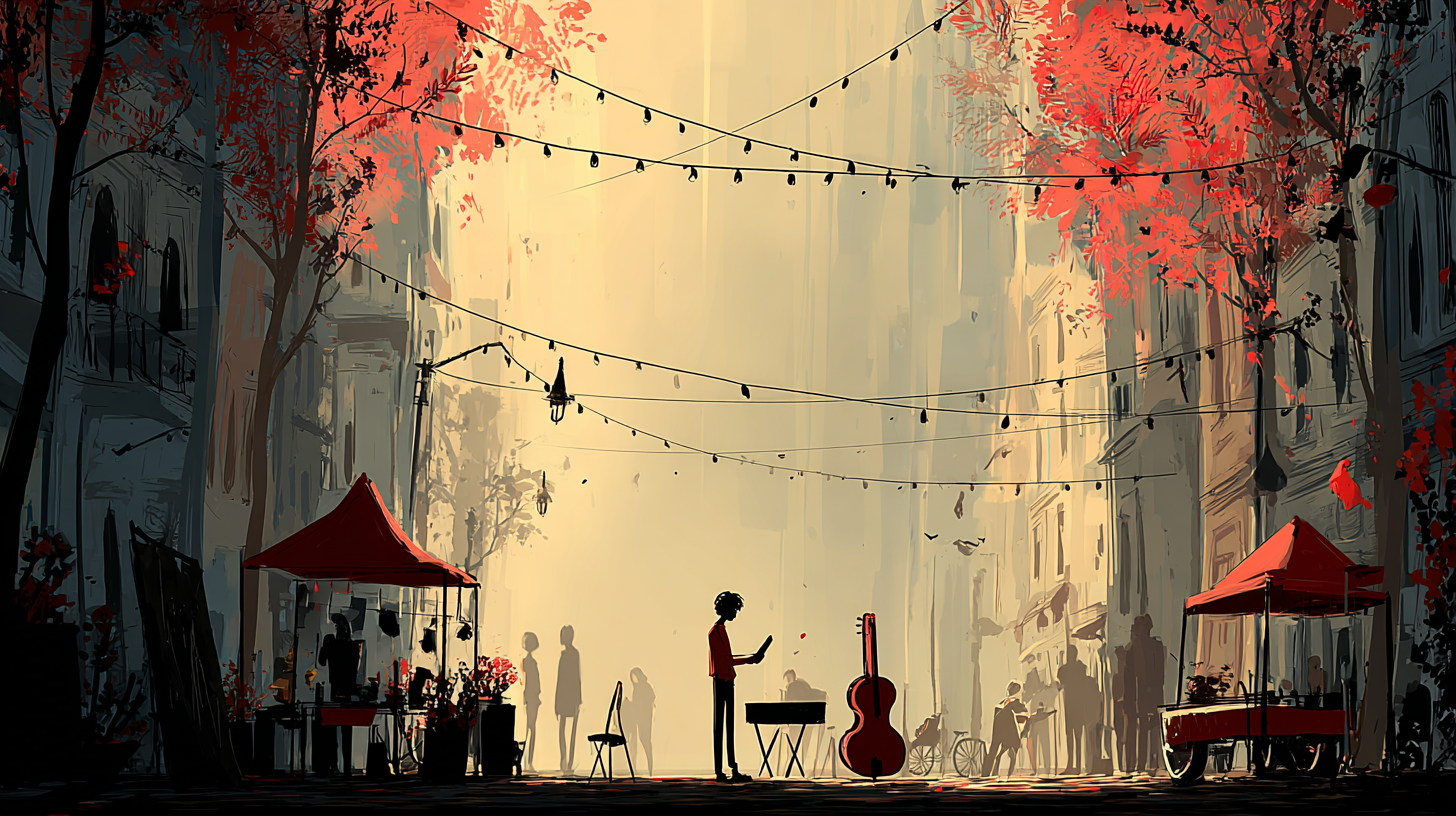“A road in a city or town where cars and people go.”
「街の中にある車や人が通る道」
以下は英単語 “street” に関するストーリー型学習コンテンツです。まずは大枠の意味を理解して最後の文章で確認しましょう。
主な意味(main meaning)
| 品詞 | 発音記号 (IPA) | 意味(簡潔) | 英語例文 |
|---|---|---|---|
| 名詞 | /striːt/ | 車や人が通る都市や町の道 | The street was crowded with shoppers. |
| 形容詞 | /striːt/ | 街頭での、路上の | Street musicians played lively tunes. |
語源(etymology)
「street」はラテン語 strata(舗装された道)から来ており、「石やレンガでしっかり作られた道」というイメージが核にあります。
類義語(synonyms)
| 類義語 | 例文 |
|---|---|
| road | This road leads to the countryside. |
| avenue | We walked along the beautiful avenue lined with trees. |
| boulevard | The café is located on a busy boulevard. |
| lane | The narrow lane goes to the river. |
| roadway | The roadway was blocked by construction. |
反義語(antonyms)
| 反義語 | 例文 |
|---|---|
| highway | The highway connects cities over long distances. |
| off-road | He enjoys driving off-road in the mountains. |
コロケーション(collocations)
| コロケーション | 例文 |
|---|---|
| cross the street | Always look both ways before you cross the street. |
| busy street | A busy street can be dangerous for small children. |
| street market | We bought fresh fruit from the street market. |
| street lamp | The street lamp lit up the sidewalk. |
| street performer | A street performer entertained the crowd. |
2項表現(binomials)
| 2項表現 | 例文 |
|---|---|
| streets and avenues | The city is full of streets and avenues. |
| life and death | Crossing without looking can be a matter of life and death. |
英語ストーリー(english story)
It was Saturday morning, and the busy street outside Emma’s apartment was already full of life. Street (street: 街の道) performers played cheerful music, while shoppers moved from one street market (street market: 路上市場) stall to another. Emma had planned to meet her friend Alex at a small café located on a wide boulevard (boulevard: 大通り).
She left her building, carefully checking both sides before crossing the street (cross the street: 道を渡る). A street lamp (street lamp: 街灯) above her flickered in the bright morning sunlight. On the other side, she saw Alex waving. They walked together along the boulevard, passing a road (road: 道) that led to a quieter neighborhood.
As they approached the café, they noticed a lane (lane: 小道) behind it. “That lane reminds me of my grandmother’s village,” Alex said. They decided to explore it later. The café was small but cozy, and from the window they could watch the busy street below.
While sipping coffee, they talked about traveling. Alex said he once drove along a highway (highway: 幹線道路) that connected several cities. Emma, on the other hand, preferred walking through streets and avenues (streets and avenues: 通りや並木道) in foreign towns to discover local life.
After finishing their coffee, they stepped outside. A street performer (street performer: 路上芸人) was juggling. “Sometimes,” Alex said with a smile, “street life can teach you more than books.” Emma agreed. They then walked down the lane, leaving the noise behind. It felt like stepping into a different world, quiet and calm—proof that even in the busiest city, peace is never far away.
和訳
土曜日の朝、エマのアパートの外のにぎやかな**street(街の道)**は、すでに活気にあふれていた。**street performers(路上芸人)は陽気な音楽を演奏し、買い物客はstreet market(路上市場)の屋台を渡り歩いていた。エマは友人アレックスと、広いboulevard(大通り)**にある小さなカフェで会う予定だった。
建物を出るとき、エマは道を渡る(cross the street)前に両側をしっかり確認した。上には**street lamp(街灯)があり、朝の明るい日差しの中でちらちらと光っていた。向こう側にはアレックスが手を振っていた。二人は一緒にboulevard(大通り)を歩き、静かな住宅街へと続くroad(道)**を通り過ぎた。
カフェの近くには**lane(小道)があった。「この小道、祖母の村を思い出すな」とアレックスは言った。二人は後でそこを探検することに決めた。カフェは小さいが居心地がよく、窓からにぎやかなstreet(街の道)**を見下ろせた。
コーヒーを飲みながら旅行の話になった。アレックスは、いくつかの都市をつなぐ**highway(幹線道路)を車で走ったことがあると言った。一方エマは、外国の町でstreets and avenues(通りや並木道)**を歩きながら地元の生活を発見するのが好きだった。
コーヒーを飲み終えると、外に出た。そこでは**street performer(路上芸人)**がジャグリングをしていた。「時には、**street life(街の生活)**は本より多くのことを教えてくれるんだ」とアレックスは笑顔で言った。エマも同意した。そして二人は小道を歩き、にぎやかさから離れた。そこは静かで落ち着いた別世界のようで、どんなに忙しい街でも、平和はすぐそばにあるのだと感じられた。
Q&A
Q: “Street” と “Road” の違いは?
A: “Street” は主に都市や町の中で、人や車が通り、建物が並ぶ道を指します。”Road” は都市・田舎問わず、場所と場所をつなぐ道全般を指します。
Q: “Street” と “Avenue” の違いは?
A: “Avenue” は都市の中の幅広い通りで、しばしば木が植えられていることが多いです。”Street” は通りの幅やデザインに関係なく、町中の道を指します。
Q: “Street” と “Boulevard” の違いは?
A: “Boulevard” は中央分離帯や木が並ぶ幅広い大通りを指します。景観や都市計画の要素が強く、”street” より格式ばった響きがあります。
Q: “Street” と “Lane” の違いは?
A: “Lane” はとても細い道や小道を指します。住宅街や村の道などに使われ、”street” より交通量が少ないのが一般的です。
Q: “Street” と “Roadway” の違いは?
A: “Roadway” は車が走る部分を意味し、歩道を含まない場合が多いです。”Street” は歩道や沿道の建物まで含む場合があります。
Q: “Street” と “Highway” の違いは?
A: “Highway” は都市間や長距離を結ぶ高速道路や幹線道路を指します。信号や交差点が少なく、高速で走ることが目的です。
Q: “Street” と “Off-road” の違いは?
A: “Off-road” は舗装された道路以外の場所、例えば砂地、山道、草原などを指します。”Street” は舗装された都市の道です。
Q: “Cross the street” と “Cross the road” の違いは?
A: どちらも「道を渡る」という意味ですが、”cross the street” は都市の道を渡る場合に、”cross the road” は都市でも田舎道でも使われます。
Q: “Busy street” と “Busy road” の違いは?
A: “Busy street” は都市の中で車や人通りが多い道を指します。”Busy road” は都市でも郊外でも使え、主に車の交通量を指します。
Q: “Street market” と “Market” の違いは?
A: “Street market” は通りや広場に屋台や露店が並ぶ市場です。”Market” は建物の中の市場やスーパーマーケットも含みます。
Q: “Street lamp” と “Lamp” の違いは?
A: “Street lamp” は道路や歩道を照らす街灯です。”Lamp” は机の上のランプや室内用照明も含む幅広い意味です。
Q: “Street performer” と “Performer” の違いは?
A: “Street performer” は路上で芸を披露する人です。”Performer” は劇場やイベント会場など、場所を問わず芸をする人全般を指します。
Q: “Streets and avenues” と “Roads and highways” の違いは?
A: “Streets and avenues” は都市の中の道をイメージします。”Roads and highways” は都市間や郊外を結ぶ道をイメージします。



コメント